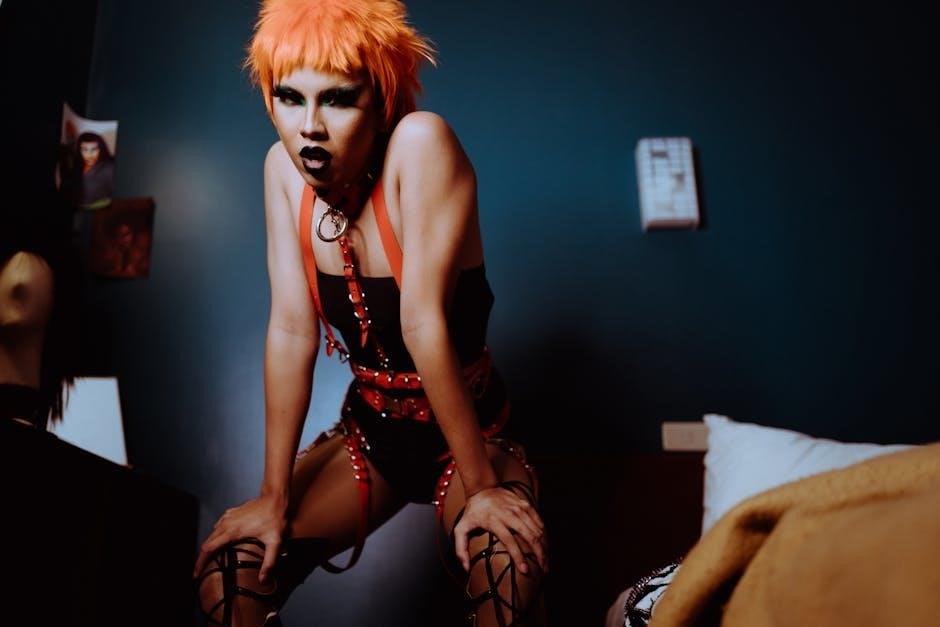Cathy J․ Cohen’s essay explores the radical potential of queer politics through the lens of marginalized groups, challenging single-issue approaches and advocating for intersectional coalitions to address systemic oppression․
Overview of the Article’s Theme
Cathy J․ Cohen’s essay, “Punks, Bulldaggers, and Welfare Queens,” critiques the limitations of queer politics that prioritize single-issue identities over intersectional approaches․ She argues that mainstream queer activism often neglects the experiences of marginalized groups, such as punks, bulldaggers, and welfare queens, who embody non-normative positions shaped by race, class, gender, and sexuality․ Cohen contends that these groups’ marginalization reveals the interconnected nature of oppression, challenging activists to move beyond simplistic dichotomies․ By centering these figures, Cohen advocates for a radical politics that fosters coalitions across diverse forms of marginalization, emphasizing the need for transformative change that addresses the intersections of ideological, social, and economic inequalities․
Importance of Intersectionality in Queer Politics
Cathy J․ Cohen emphasizes intersectionality as crucial for queer politics, highlighting how overlapping identities like race, class, and gender shape unique experiences of marginalization․ By focusing on punks, bulldaggers, and welfare queens, she illustrates how single-issue activism fails to address the complex, interconnected forms of oppression faced by these groups․ Intersectionality, therefore, becomes a vital framework for building inclusive coalitions that challenge multiple systems of power simultaneously․ Cohen argues that without this approach, queer politics risks reinforcing existing inequalities, underscoring the necessity of an intersectional lens to achieve truly transformative social change and radical political engagement․

Historical Context of Queer Politics
Queer politics emerged in the late 20th century, shaped by civil rights movements but often limited by single-issue approaches, highlighting the need for intersectional frameworks․
The Emergence of Queer Theory in the Late 20th Century
Queer theory emerged as a critical framework in the late 20th century, challenging traditional notions of sexual identity and gender․ It emphasized fluidity and diversity, rejecting rigid binaries․ Scholars like Judith Butler and Eve Sedgwick played pivotal roles, influencing academic and activist discourse․ This period saw the rise of intersectional perspectives, highlighting how race, class, and gender intersect with sexuality․ The theory’s development was marked by debates on identity politics and the limitations of single-issue activism․ It laid the groundwork for more inclusive and radical approaches to queer politics, as explored by Cathy Cohen in her work on marginalized groups like punks, bulldaggers, and welfare queens․
Limitations of Single-Oppression Approaches in Queer Activism
Single-oppression approaches in queer activism often overlook the interconnected nature of marginalization, failing to address how race, class, and gender intersect with sexuality․ These approaches prioritize single issues, such as sexual identity, while neglecting the compounded struggles of individuals like punks, bulldaggers, and welfare queens․ Cathy Cohen critiques this narrow focus, arguing that it excludes those at the intersections of multiple forms of oppression․ By emphasizing the importance of intersectionality, Cohen highlights how single-issue activism reinforces systemic inequalities and limits the potential for transformative change․ This critique underscores the need for a more inclusive and radical queer politics that accounts for diverse experiences of marginalization․

Key Groups in Cohen’s Framework
Cohen’s framework highlights punks, bulldaggers, and welfare queens as emblematic figures of intersectional marginalization, each embodying unique yet interconnected forms of oppression and resistance․
Punks as Non-Normative Political Agents
Cohen positions punks as non-normative political agents, leveraging their subversive identities to challenge dominant structures․ By rejecting mainstream norms, punks embody a radical resistance, offering a political strategy that questions societal binaries and power dynamics․ Their non-conformity serves as a basis for progressive coalitions, highlighting the potential for transformative politics․ Through their marginalization, punks exemplify how non-normative positions can be a foundation for resistance and change, aligning with Cohen’s call for intersectional approaches in queer activism․
Bulldaggers and Their Marginalized Position
Bulldaggers, as discussed in Cohen’s framework, represent a deeply marginalized group within queer communities, often facing intersectional oppression based on race, class, and gender․ Their non-normative identities and behaviors place them at the fringes of both mainstream society and queer activism․ Cohen highlights how bulldaggers, like other marginalized groups, are frequently excluded from political movements that prioritize single-issue agendas․ Their experiences of multiple forms of oppression underscore the limitations of queer politics that fail to address intersecting inequalities․ By centering bulldaggers, Cohen emphasizes the need for a radical politics that acknowledges and challenges these overlapping systems of marginalization, advocating for a more inclusive and transformative approach to queer activism․
Welfare Queens as Symbols of Intersectional Marginalization
Welfare queens, as depicted in Cohen’s analysis, embody the intersectional marginalization faced by those at the crossroads of race, gender, and class․ This term, often weaponized in political rhetoric, symbolizes how certain groups are demonized and excluded from both economic and social systems․ Cohen argues that welfare queens, like punks and bulldaggers, are pushed to the fringes of society, highlighting the failures of single-issue political movements to address their unique struggles․ Their marginalization reflects broader systemic inequalities and the need for a radical, coalition-based politics that prioritizes the voices and experiences of those most oppressed, fostering a more inclusive and transformative queer activism․

Intersectionality and Its Role in Radical Politics
Intersectionality in radical politics unites marginalized voices, addressing race, class, and gender to challenge systemic oppression and foster transformative change for groups like punks, bulldaggers, and welfare queens․
Cohen’s Critique of Mainstream Queer Activism
Cathy Cohen critiques mainstream queer activism for prioritizing single-issue oppression, often overlooking intersections of race, class, and gender․ She argues that this narrow focus marginalizes groups like punks, bulldaggers, and welfare queens, whose experiences are shaped by multiple forms of oppression․ Cohen contends that queer politics must move beyond simplistic identity-based frameworks to address the interconnected systems of power that perpetuate inequality․ By centering the most marginalized, she advocates for a radical, inclusive approach that challenges not just sexual norms but also economic and racial injustices․ This critique calls for a shift from fragmented activism to coalitions that embrace shared marginality and collective resistance․
The Link Between Ideological and Economic Marginalization
Cathy Cohen emphasizes the interconnection between ideological and economic marginalization, particularly for groups like punks, bulldaggers, and welfare queens․ Ideological marginalization excludes them from dominant discourses, perpetuating economic disparities․ This exclusion limits access to resources and jobs, reinforcing systemic inequality․ Cohen argues that addressing only one aspect is insufficient; transformative politics must confront both ideological and economic dimensions․ This dual approach is crucial for dismantling intersecting systems of oppression that perpetuate their marginalization, highlighting the need for a holistic strategy to achieve meaningful change․

Cohen’s Vision for Radical Queer Politics
Cohen’s vision emphasizes coalitions among marginalized groups, challenging intersecting oppressions of race, class, gender, and sexuality, fostering transformative change beyond single-issue activism․
Coalitions Based on Non-Normative Positions
Cohen advocates for coalitions rooted in non-normative identities, emphasizing shared marginalization across race, class, gender, and sexuality․ By uniting groups like punks, bulldaggers, and welfare queens, she envisions a politics that transcends single-issue activism․ These coalitions challenge dominant structures by amplifying the voices of those most excluded from mainstream discourse․ Cohen argues that such alliances can foster transformative change by addressing the intersections of oppression, rather than isolating them․ This approach seeks to dismantle systemic inequalities by creating solidarity among marginalized communities, ultimately moving beyond fragmented political movements toward a more inclusive and radical queer politics․
Challenges to Transformative Politics
Reinforcement of Dichotomies in Queer Activism
Queer activism often reinforces binary categories, undermining efforts to challenge dominant structures and achieve transformative change, as highlighted by Cohen’s critique of exclusionary practices within the movement․
Cohen critiques how queer activism often inadvertently reinforces simplistic binaries, such as gay/straight or male/female, overshadowing the complexities of race, class, and gender․ This reinforcement limits the movement’s potential to address intersectional oppression, as marginalized groups like punks, bulldaggers, and welfare queens are often excluded from mainstream queer agendas․ By failing to challenge these dichotomies, queer politics risks perpetuating the same systems of exclusion it seeks to dismantle, highlighting the need for a more inclusive and radical approach to transformative change․ Cohen argues that true radical potential lies in embracing non-normative identities and their unique political positioning․
Broader Implications of Cohen’s Work
Cohen’s work has profoundly influenced contemporary queer and feminist studies, emphasizing intersectionality and the importance of addressing marginalized groups in social justice movements․
Influence on Contemporary Queer and Feminist Studies
Cathy Cohen’s work has significantly shaped contemporary queer and feminist scholarship, emphasizing intersectionality and the need to address race, class, and gender in queer politics․ Her critique of single-issue activism has inspired scholars to adopt a more nuanced approach, recognizing the interconnected nature of oppression․ Cohen’s framework has been widely cited and incorporated into various studies, influencing debates on marginalization and coalition-building․ Her analysis of non-normative groups has expanded the scope of queer theory, encouraging a more inclusive understanding of identity and power․ As a result, her ideas continue to inform feminist and queer studies, pushing for a more radical and transformative political agenda․
Cathy Cohen’s essay underscores the transformative potential of queer politics by emphasizing intersectionality and coalition-building among marginalized groups, challenging single-issue approaches to achieve social justice․
The Radical Potential of Queer Politics Revisited
Cathy Cohen’s work revisits the radical potential of queer politics by highlighting the importance of intersectionality and marginalized voices․ She critiques mainstream activism for often excluding those at the intersections of race, class, and sexuality, such as punks, bulldaggers, and welfare queens․ These groups, often overlooked, embody the non-normative positions that Cohen argues should form the basis of transformative coalitions․ By centering these marginalized identities, Cohen advocates for a politics that challenges systemic oppression and fosters solidarity across different forms of marginalization․ Her vision calls for a shift from single-issue approaches to a more inclusive and radical queer movement․